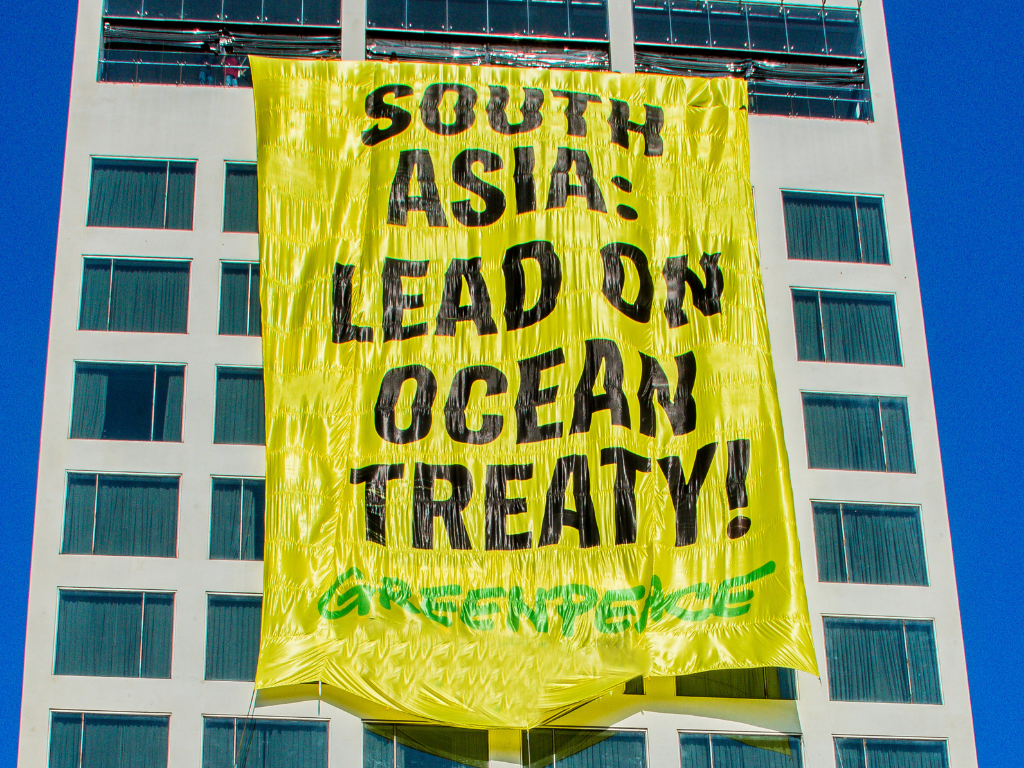3rd February, 2025. Greenpeace South Asia delivers a strong message for Ocean protection on the eve of Sri Lanka’s National Day celebrations in Colombo, where regional States Leaders and representations will gather to honour the country’s Independence, declared on the 4th of February 1948. A large banner reading “South Asia: Lead on Ocean Treaty !” was deployed on one of the prominent high-rise hotels in Colombo to welcome the positive steps by regional leadership in favor of the Global Ocean Treaty that will allow the creation of large scale sanctuaries on the High Seas [1].
In September 2024 at the UN General Assembly, both Bangladesh and The Maldives ratified this new Treaty — formally known as the Agreement on Biodiversity in Areas Beyond National Jurisdiction (BBNJ) — and India also confirmed its signature, when Nepal had signed the year before. To complete the picture, this last December, Sri Lanka in turn committed to sign and ratify the BBNJ Agreement [2]. “By taking this step, the Bay of Bengal nations are demonstrating bold, forward-thinking leadership in protecting marine biodiversity on the High Seas and combating climate change. This commitment not only safeguards the livelihoods of their people today but also ensures a healthier, more sustainable future for generations to come,” says Anita Perera, Campaigner at Greenpeace South Asia.
The Oceans cover 71 % of the Earth’s surface, they host most of the biodiversity and represent the largest carbon sink on the planet, and have so far absorbed more than 90% of the excess heat from human greenhouse gas emissions. Yet they are facing multiple threats, from overfishing, mining, pollution, acidification and record water warming, which further leads to coral bleaching, shifts in marine species distribution, sea ice loss, sea level rise and extreme weather events. As a result, their ability to cope and absorb as much carbon dioxide to keep pace with human emissions is being compromised, which can only exacerbate climate change impacts [3]. In contrast, the global Ocean Treaty will facilitate the declaration of large protected areas over key marine ecosystems to support their resilience and achieve 30% protection of the High Seas by 2030.
“The Oceans are critical for people’s livelihoods and food sovereignty, but also to mitigate the dire consequences of climate change and extreme weather crisis that have become the norm in South Asia and elsewhere: Cyclones, heatwaves, droughts, floods and landslides to name a few. Now is the time to curb fossil fuel emissions and preserve our best climate ally, the Ocean.” says Avinash Chanchal, Deputy Programme Director at Greenpeace South Asia.“In this period of celebration for Sri Lanka’s Independence Day, we are acknowledging all the recent efforts made by our governments but also urging them to ensure the full ratification of the Global Ocean Treaty on time for the UN Ocean Conference in June 2025, in order to enable protection measures with effective impact in the short term“, added Anita Perera

Greenpeace Banner drop at Hotel Sophia on February 2nd, 2025.
Media Contact:
Avinash Chanchal Kumar, Deputy Programme Director for Campaigns – Greenpeace South Asia
Email: [email protected]
Anita Perera, Campaigner at Greenpeace South Asia – Sri Lanka
Email: [email protected]
Notes to editors:
[1] The Agreement on Biodiversity in Areas Beyond National Jurisdiction (BBNJ Agreement) was adopted in June 2023. This is the third Agreement implemented under the United Nations Convention on the Law of the Sea (UNCLOS). To take effect, the Global Ocean Treaty requires at least 60 governments to incorporate it into national law. As of today, 107 countries have signed the Treaty, with 15 completing the ratification process. See status of Treaty here.
[2] Press briefing of Sri Lanka’s Cabinet Decision taken on 2024-12-23: https://www.cabinetoffice.gov.lk/cab/index.php?option=com_content&view=article&id=16&Itemid=49&lang=en&dID=12946
[3] The ocean is the greatest carbon sink on Earth, holding more than 50 times the amount of carbon in the atmosphere. The absorption of carbon dioxide by the ocean has so far provided a buffer against even more extreme impacts from the climate crisis, but this has come at a huge cost to the ocean. Ocean warming, acidification and deoxygenation are causing the health of the ocean to drastically deteriorate. The ocean’s key role in the carbon cycle is therefore being compromised. For more information, see Greenpeace’s report, “In Hotter Water: How the Global Ocean Treaty can boost climate action“.



